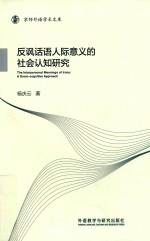图书介绍
反讽话语人际意义的社会认知研究 英文PDF|Epub|txt|kindle电子书版本网盘下载

- 杨庆云著 著
- 出版社: 北京:外语教学与研究出版社
- ISBN:9787513552769
- 出版时间:2014
- 标注页数:266页
- 文件大小:37MB
- 文件页数:287页
- 主题词:讽刺-话语语言学-研究-英文
PDF下载
下载说明
反讽话语人际意义的社会认知研究 英文PDF格式电子书版下载
下载的文件为RAR压缩包。需要使用解压软件进行解压得到PDF格式图书。建议使用BT下载工具Free Download Manager进行下载,简称FDM(免费,没有广告,支持多平台)。本站资源全部打包为BT种子。所以需要使用专业的BT下载软件进行下载。如BitComet qBittorrent uTorrent等BT下载工具。迅雷目前由于本站不是热门资源。不推荐使用!后期资源热门了。安装了迅雷也可以迅雷进行下载!
(文件页数 要大于 标注页数,上中下等多册电子书除外)
注意:本站所有压缩包均有解压码: 点击下载压缩包解压工具
图书目录
Chapter One Introduction1
1.1 Background of the Study2
1.1.1 An Overview of the Concept of Irony4
1.1.2 Irony and Some Related Concepts9
1.1.3 Irony Family12
1.1.4 A Working Definition14
1.2 Research Objectives18
1.3 Research Methodology19
1.3.1 A Socio-cognitive Approach19
1.3.2 Data Sources20
1.3.3 Methods of Data Analysis21
1.4 Organization of the Book21
Chapter Two Literature Review24
2.1 Traditional Rhetorical and Semantic Approaches to Irony24
2.2 Psycholinguistic Approaches to Irony27
2.2.1 Giora's Graded Salience Hypothesis of Irony28
2.2.2 Gibbs' Direct View of Irony29
2.3 Pragmatic Approaches to Irony31
2.3.1 Grice's View on Irony31
2.3.2 Leech's Irony Principle35
2.4 Cognitive Approaches to Irony37
2.5 Cognitive and Pragmatic Approaches to Irony39
2.5.1 The Echoic Mention/Interpretation Theory:Sperber&Wilson's Study of Irony39
2.5.2 The Pretense Theory of Irony43
2.6 Social Approaches to Irony45
2.6.1 Anolli,Inhfantino&Ciceri's"Fencing Game"Model of Irony45
2.6.2 Hutcheon's Evaluative Function of Irony48
2.7 Summary50
Chapter Three A Socio-cognitive Analysis of Ironic Discourses54
3.1 Theoretical Foundations for the Socio-cognitive Framework of Ironic Discourses54
3.1.1 The Frame Theory55
3.1.2 The Theory of Cognitive Reference Point58
3.1.3 The Theory of Context61
3.1.3.1 Social and Functional Approaches to the Study of Context61
3.1.3.2 Cognitive Approaches to the Study of Context62
3.1.3.3 Socio-cognitive Approaches to the Study of Context63
3.1.3.4 The Socio-cognitive Context and Irony64
3.2 The Tentative Model of the Interpersonal Meanings Construction in Irony65
3.2.1 Basic Assumptions66
3.2.2 The Tentative Model and Elaborations of Its Components74
3.2.2.1 The Interplay of Society,Cognition and Language in Ironic Discourses76
3.2.2.2 The Reference Frame and the Emergent Frame79
3.2.2.3 The Frame-profiling81
3.3 The Illustrations of the Model83
3.3.1 The Reversing Reference Points Pattern in Ironic Discourses83
3.3.2 The Analogical Reference Points Pattern in Ironic Discourses85
3.3.3 The Progressive Reference Points Pattern in Ironic Discourses87
3.3.4 The Bird's Nest Reference Points Pattern in Ironic Discourses90
3.4 Summary93
Chapter Four Identity Negotiation in Ironic Discourses94
4.1 Introduction94
4.2 Static Identity Negotiation in Ironic Discourses100
4.2.1 Identity Displaying in Ironic Discourses100
4.2.2 Identity Defending in Ironic Discourses103
4.2.3 Identity Profiling in Ironic Discourses105
4.3 Dynamic Identity Negotiation in Ironic Discourses111
4.3.1 Identity Shifting in Ironic Discourses111
4.3.2 Identity Veiling in Ironic Discourses115
4.3.3 Identity Unveiling in Ironic Discourses121
4.3.4 Identity Reversing in Ironic Discourses124
4.4 Summary129
Chapter Five Stance-taking in Ironic Discourses131
5.1 Introduction131
5.2 Epistemic Stance-taking in Ironic Discourses137
5.2.1 The Precedent Utterance-based Ironic Discourses140
5.2.2 Mutual Manifest Physical Environment-based Ironic Discourses142
5.2.3 Encyclopedia-based Ironic Discourses145
5.2.4 Mutual Knowledge/Assumption-based Ironic Discourses154
5.3 Affective Stance-taking in Ironic Discourses157
5.3.1 Positive Stance-taking in Ironic Discourses159
5.3.2 Negative Stance-taking in Ironic Discourses171
5.4 Summary179
Chapter Six Aligning Interpersonal Relationships in Ironic Discourses181
6.1 Introduction181
6.2 Power-loaded Ironic Discourses183
6.2.1 Status-upgrading in Ironic Discourses185
6.2.1.1 Status-upgrading by Degrading Others in Ironic Discourses185
6.2.1.2 Status-upgrading by Self-effacing in Ironic Discourses188
6.2.1.3 Status-upgrading by Feigning Ignorance in Ironic Discourses191
6.2.2 Maximizing Hierarchical Status Differential in Ironic Discourses195
6.2.2.1 Rank/Position-based Status Differential in Ironic Discourses195
6.2.2.2 Administrative Status-based Differential in Ironic Discourses201
6.2.2.3 Nationality-based Status Differential in Ironic Discourses203
6.2.2.4 Legitimacy-based Status Differential in Ironic Discourses205
6.2.3 Downgrading the Addressee's Status by Paying Compliments to the Third Party in Ironic Discourses208
6.2.4 Depowering the Addressee in Ironic Discourses212
6.3 Solidarity-loaded Ironic Discourses214
6.3.1 Solidifying the Interpersonal Relationships in Ironic Discourses216
6.3.1.1 Building an In-group Community in Ironic Discourses217
6.3.1.2 Strengthening Intimacy by Derogating Others in Ironic Discourses220
6.3.1.3 Defusing the Tension between the Interlocutors in Ironic Discourses222
6.3.2 Alienating the Interpersonal Relationships in Ironic Discourses224
6.3.2.1 Vetoing the Superior's Attempt to Solidify Relationships in Ironic Discourses225
6.3.2.2 Excluding Oneself from the In-group Community in Ironic Discourses226
6.3.2.3 Driving a Wedge in Ironic Discourses228
6.4 Summary230
Chapter Seven Conclusion232
7.1 Major Arguments and Contributions of the Present Research232
7.2 The Implications of the Present Research235
7.3 Limitations and Suggestions for Further Research237
Bibliography238